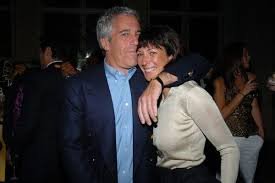Ghislaine Maxwell sentenced to 20 years in NYC Jeffrey Epstein sex trafficking case

Ghislaine Maxwell has been sentenced to 20 years in prison for helping Jeffrey Epstein sexually abuse underage girls for at least a decade between the 1990s and 2000s. The British former socialite, whose late father rose to prominence in the U.K. as a media baron and member of Parliament, faced a district court hearing in Manhattan that lasted several hours from the late morning until mid-afternoon.
Following a widely publicized criminal trial, Maxwell was found guilty last December of conspiring with Epstein — her longstanding associate and romantic partner for a time — to groom, recruit and sexually abuse minors as part of the late financier’s now-infamous trafficking ring. Maxwell was convicted of multiple charges related to sex trafficking and conspiracy.
Maxwell’s sentence includes five additional years of supervised release and a $750,000 fine. Judge Alison Nathan, who presided over the case, ordered her to immediately pay $100 for each count on which she was convicted.
Bobbi Sternheim, Maxwell’s defense lawyer, requested her transfer to a women’s prison in Danbury, Connecticut, along with her enrollment in a family initiated treatment program to address past trauma. Her legal team was given 14 days to appeal Maxwell’s sentence.
“Today’s sentence holds Ghislaine Maxwell accountable for perpetrating heinous crimes against children,” Williams wrote in a statement. “We again express our gratitude to Epstein and Maxwell’s victims for their courage in coming forward, in testifying at trial, and in sharing their stories as part of today’s sentencing.”
Maxwell’s defense asked the court to sentence her to no more than five years in prison. Prosecutors had requested that she serve 30 to 55 years in prison.
Maxwell, now 60, was initially indicted in July of 2020 and taken into federal custody, where she was held without bail for 16 months leading up to her trial. The arrest came about a year after Epstein died by apparent suicide in his New York City jail cell while facing federal sex trafficking and conspiracy charges. Epstein’s death sparked further calls for justice from victims and government officials, since his own trial had not yet begun.
Maxwell also spoke Tuesday in response.
“It is hard for me to address the court after listening to the pain and anguish expressed in the statements made today. The terrible impact on the lives of so many women is difficult to hear and even more difficult to absorb,” she told the court. “I acknowledge their suffering and empathize deeply with all the victims in this case.”
“It is the greatest regret of my life that I ever met Jeffrey Epstein,” Maxwell said. “I believe that Jeffrey Epstein was a manipulative, cunning and controlling man who lived a profoundly compartmentalized life and fooled all those in his orbit. Variously, his victims considered him a godfather, mentor, benefactor, friend, lover. It is unfathomable today to think that is how he was viewed contemporaneously. His impact on all those who were close to him has been devastating.”
“Jeffrey Epstein should have been here before all of you. He should have stood before you years ago, in 2005, in 2009, and again in 2019 — all the many times he was accused, charged, prosecuted — he should have spare victims the years of chasing justice. But today is ultimately not about Epstein,” she continued. “It is for me to be sentenced and for the victims to address me alone in court. To you, I say: I am sorry for the pain you experienced. I hope my conviction along with my harsh incarceration brings you closure.”
Maxwell’s statement concluded with comments acknowledging “the pain” her loved ones have experienced and “the relationships [she has] lost” as a result of the case.
“It is my sincerest wish to all those in this courtroom, and all those outside, that this day brings a terrible chapter to an end. And to those of you who spoke here today and those who did not, may this day help you travel from darkness into light,” Maxwell said.
Soon after the conviction, her attorneys sought a retrial on the grounds that the jury’s decision was biased, since one juror had experienced sexual abuse as a child but did not disclose that fact during jury selection. The judge denied Maxwell’s request and rejected her claim regarding potential bias.
“In sum, the Court concludes that the evidence in the record does not support finding that Juror 50 was biased,” Nathan said in response. “Juror 50’s sworn testimony did not reveal actual partiality. And Juror 50 was not impliedly or inferably biased.”



